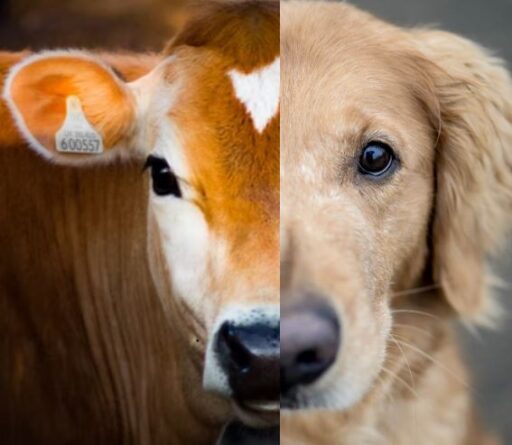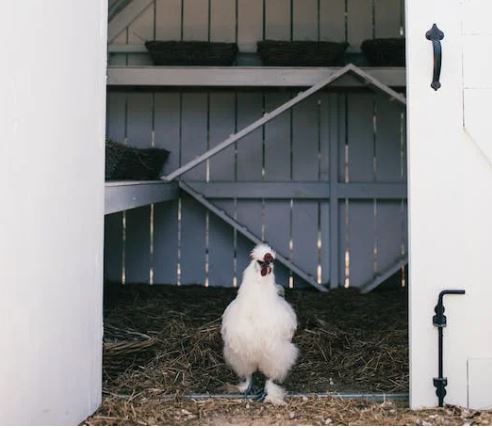Many people erroneously believe that buying local meat from small-scale animal farms will solve the environmental, public health and ethical issues of factory farming. Firstly, 70% of cows and about 99% of other animal products in the U.S. come from factory farms. And despite marketing messages that want you to believe small farms are a solution, this is not the case.
Nearly equal environmental impact

People often believe that grass-fed, local meat and animal products significantly reduce the environmental impact of these products. Yet the production phase of food typically accounts for a whopping 83% of food’s carbon footprint.
In contrast, factors like transport distance contribute only about 10% to a product’s carbon footprint. The two biggest culprits in greenhouse gas emissions are changes in land use (e.g. converting forests into fields) and farming processing (e.g. methane emissions, machinery, emissions from fertilizers).
Eating local does not have a significant impact on carbon emissions because transport is not to blame for a large portion of a food’s carbon footprint. What you eat is far more important than how far it traveled. If you’re buying local meat, the environmental damage has already been done by the fact that it’s meat.
Furthermore, environmental research does not support “eat local” trends. Even the highest-impact plant foods, like tofu, still emit much lower greenhouse gases when shipped halfway around the world than does local chicken. The primary atmospheric impact of food is land use, not transport.
Soil Health
Another area of environmental concern is soil health and regeneration. Research like this 2018 study published in Environmental Research Letters indicate that grass-fed cows have an even larger ecological footprint than factory farmed cows, as they produce more methane (because it takes them longer to grow) and require more land. This would increase the U.S.’s total methane emissions by approximately 8%, according to the researchers.
Mono-cropping

A third environmental issue with our food systems is mono-cropping. Of course, much of these mono-cropped foods like soy and grains are fed to farmed animals, so animal agriculture is still the primary culprit. But to minimize the ecological impacts of our food, sourcing plant foods from local farms and buying foods with labels like “regenerative organic, Soil Association Certified Organic, fair trade, rainforest alliance, organic and non-GMO project verified” are trustworthy seals.
Not enough land

As former livestock veterinarian and whistleblower Dr. Alice Brough says in The End of Medicine, meeting the current demand for animal products with small farms would require “about 12 planets…Clearing land for livestock grazing and feed cropping is the number one driver of deforestation worldwide. Feeding the current demand for animal products with many smaller farms would increase that land use.”
Small-scale farming still risks pandemics

Serious zoonotic diseases can emerge from poorly-equipped small farms. Dr. Brough explains, “[Small-scale farms] are not really what people like to imagine. Probably some of the worst concoctions of disease I’ve ever seen have been on small farms because they don’t have the income to afford comprehensive diagnostic testing [and] preventative healthcare. Part of the reason why African swine fever ripped through China in the way that it has is because there were so many backyard farmers… It’s almost impossible to regulate huge numbers of small farms.”
Buying local meat perpetuates injustice
A classist, colonialist argument

Claiming that buying local meat and animal products from small-scale farms is a solution to factory farming is unjust. It ignores the fact that the world cannot supply energy-intensive animal products for the global population. Animal products are an incredibly inefficient, wasteful source of energy.
The world can feed many more people on a plant-based diet than it can on an animal-based diet. If we stop breeding billions of farmed animals, we could feed an additional four billion people with the cropland currently used to grow animal feed. There would be more than enough food to go around. As the world population is projected to reach 9.7 billion by 2050, having the cropland to grow more food is essential.
As Dr. Saliesh Rao, Executive Director of Climate Healers, says the argument is essentially: “The problem is not that we are eating animal foods; the problem is that the riffraff are eating animal foods… if you can make the poor people stop eating animal foods, there will be plenty for the rich people. So it is a very classist, colonialist argument to make.”
The end result is the same: choosing to kill when we don’t need to.

Say you’re at a restaurant and saw the following on the menu: “Golden retriever burger. Humanely raised and slaughtered.” How would you feel? Would you consider it humane for someone to kill a happy, healthy dog for food? If someone gave their dog several years of life like this, but then killed the dog for meat, would this be compassionate, kind and gentle? We hold a double standard for companion animals and another for farmed animals. Yet they do not differ in any way but our perception of them.
Many of us have rarely, if ever, interacted with farmed animals up close. But when we do so reflectively, we might question why we find it acceptable to kill them. As activist Ed Winters describes, “There is something profoundly moving about looking into the eyes of an animal. You recognize that behind those eyes is someone who is having an experience and through that recognition you can empathize with that experience.” How can we morally justify killing other creatures when we don’t have to?
Change of heart in former small scale farmer

While buying local meat from small farms might seem on the surface to provide a viable or ethical solution to factory farming, the 2017 documentary The Last Pig shows us that this is not the case. Filled with picturesque scenes of a small-scale pig farmer in upstate New York with his herd of pigs who loyally follow him around, the farmer wrestles with the reality of what he does to these intelligent creatures whom he cares for.
In contrast to the often gruesome footage of factory farm documentaries, this film appeals to viewers with endless footage of adorable pigs. Captivating scenes depict them joyfully splashing in the mud and nestling in the earth.
One of the farmer’s particularly poignant lines from the film stays with viewers long after the documentary ends: “After 10 years of looking into pig eyes, I’ve come to understand that they’re never vacant. There’s always somebody looking back at me.” The film serves as an essential reminder that factory farming is not the root problem of animal exploitation; rather, choosing to kill animals unnecessarily is.
A better solution than buying local meat: eating plants

Despite the common misperception that buying local meat from small farms will solve the environmental, public health and ethical issues of the industry, this is false. It’s something people wish to be true to continue justifying eating meat and animal products.
Yet buying local meat does not significantly reduce its environmental impact, and it is still much more damaging than buying plant foods from across the globe. Buying local meat continues to pose a threat of pandemic emergence. The earth simply cannot feed everyone on an animal-based diet; thus, pushing for more small-scale farming is a classist, colonialist argument. Finally, the end result is the same: killing unnecessarily.
If we’re honest with ourselves and with the data, we realize buying local meat is not the solution to any of these issues. Plants are.


